

Razo
Effects of discipline on learners in farm schools - Google Scholar. Blended learning. Online racial discrimination: A growing problem for adolescents. Brendesha Tynes is a visiting associate professor of psychology at the University of Michigan (2015-2016).
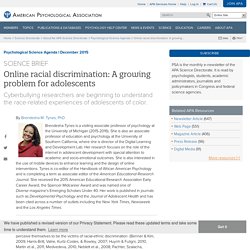
She is also an associate professor of education and psychology at the University of Southern California, where she is director of the Digital Learning and Development Lab. Her research focuses on the role of the internet in adolescent development with special attention to academic and socio-emotional outcomes. She is also interested in the use of mobile devices to enhance learning and the design of online interventions.
Tynes is co-editor of the Handbook of African American Psychology and is completing a term as associate editor of the American Educational Research Journal. She received the 2015 American Educational Research Association Early Career Award, the Spencer Midcareer Award and was named one of Diverse magazine’s Emerging Scholars Under 40. Racial discrimination is a common stressor in the lives of adolescents of color in the U.S. Has Facebook become a forum for misogyny and racism? Facebook has been making all the wrong headlines in recent weeks.

Last month, a Thai man livestreamed himself killing his 11-month-old daughter and then himself. In Cleveland, a 74-year-old man was killed by a stranger who streamed the shooting live on Facebook. Online ethics. Alt_Right White Lite: Trolling, Hate Speech and Cyber Racism on Social Media. The abuse and hate I get when I speak out hurts – but shutting up isn't an option. Do all Australians have the same right to express a public opinion without being harassed, abused and defamed?
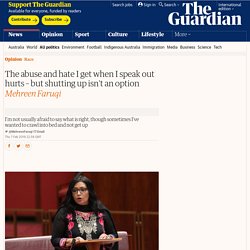
Unfortunately, I’ve learned the hard way that the answer to this question is no. Practically every day, I receive directly targeted messages on social media and through abusive phone calls, letters and emails that attempt to push me out of the political conversation simply for being who I am – a brown, migrant, Muslim woman from a Pakistani background. As soon as I speak out publicly, it’s met with relentless abuse and hate. It’s immaterial what the topic is – cruelty to animals, public education, women’s rights – the criticism isn’t about policy, it always boils down to my race, gender, culture and religion.
Cyber racism explained. Cyber racism is most commonly defined as racism which occurs in the cyber world.
This article defines, what cyber racism is all about. It ranges from blogs to social network. The author indicates the power in which cyber-racism is manifesting. Its power lies in the fact that those areas which were not public, now become exposed as the results of the internet. – daizer
This includes racism which occurs on the internet such as racist websites, images, blogs, videos and online comments as well as racist comments, images or language in text messages, emails or on social networking sites (See AHRC Factsheet 2014 [PDF] ).
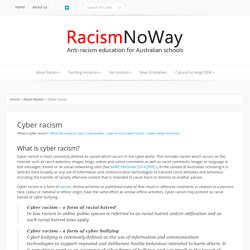
Is there structural racism on the internet? The racial inequalities afflicting Americans and our society today are in many ways a result of the result of spatial segregation.
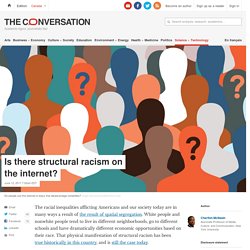
White people and nonwhite people tend to live in different neighborhoods, go to different schools and have dramatically different economic opportunities based on their race. That physical manifestation of structural racism has been true historically in this country, and is still the case today. Today’s internet is built on a similar spatial logic. People travel from website to website in search of content in the same way they travel from neighborhood to neighborhood looking for stuff to do and people to hang out with. Websites accrue and compound value as visitor traffic and site visibility increases. This is how racism is being spread across the internet. For all the advantages of being online, there are some worrying dark sides, including racism.
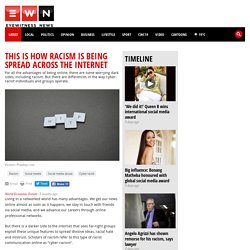
But there are differences in the way ‘cyber-racist’ individuals and groups operate. Living in a networked world has many advantages. We get our news online almost as soon as it happens, we stay in touch with friends via social media, and we advance our careers through online professional networks. But there is a darker side to the internet that sees far-right groups exploit these unique features to spread divisive ideas, racial hate and mistrust. Scholars of racism refer to this type of racist communication online as “cyber-racism”. Stamping out racism in sport means social media too. According to figures from the Home Office, only 42 arrests were made for “racial or indecent chanting” at English football matches during the 2012-13 season.
Racism is no longer an issue during sports. However, this article suggests that now racism has shifted from sports to the tweeter. Recent research suggests that around 10,000 tweets are sent around every day containing racial slurs. This article further indicates that racism has found another platform. Racists see the internet as a safe space to which they can express their thought anonymously. The article further suggests that one way to reduce racial posts would be to include an algorithm which highlights any potentially offensive language before status or comments is set. – daizer
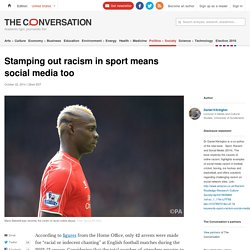
REGULATING CYBER RACISM. Racism in Digital Era Development and Initial Validation. Racism Is Still Alive And Well In Online Comment Sections. Although you rarely hear racial insults on Main Street these days, there’s a place where unashamed bigotry is all too easy to find: tossed off in the comments sections of some of the Internet’s most popular websites, today’s virtual Main Street.
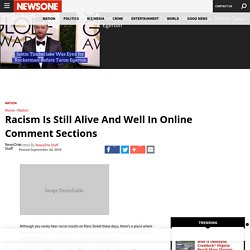
Internet anonymity has removed one of the strongest barriers to the type of language that can ruin reputations and end careers. Do these comments reflect a reversal of racial progress? Is that progress an illusion while racism thrives underground? What kind of harm are these statements doing? Could there be any value in such venting? “We’ve seen comments that people would not make in the public square or any type of civic discussion, maybe even within their own families,” said Dennis Ryerson, editor of The Indianapolis Star. At the newspaper’s website, moderators delete individual racist comments that are brought to their attention, and will take down a whole thread if such comments persist. Black racism was evident, too.
Who thinks about the consequences of online racism? In a world where few would deny the existence of racism but even fewer would ever admit to propagating it, there will always be the problem of agency.
This is a very good article. The article is about the right of online newspapers, or any other internet board, to censor any posts as they see fit. Why? They want to create a pleasant and constructive environment, and visitors should respect that. The article further indicates that it's the right of any online publication to do so, and they can do what they like. It further gives the audience the platform or anyone else that shows double standards in their moderation, they can go elsewhere, or bring it up with the company, so as to protect freedom of speech. The author has, however, a serious problem with the recent spate of arrests of people spouting racist comments, online or otherwise. That is a violation of what free speech should stand for and should be opposed at every step. My question is should we care about the arrests or the pain that racism victim suffers? – daizer
We have racism but no racists – a noun without a subject, a consequence that nobody caused, a system that nobody operates creating victims without perpetrators.
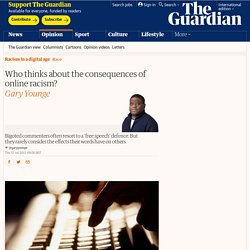
On the web people have the added cover of anonymity, creating an environment where individual writers and entire groups of people are abused because of their race or religion but few have the courage to stand openly behind their statements. On these pages I have been slated as the Guardian's "affirmative action hire", told I was "raising my son to hate white people" and asked to entertain black people's genetic propensity to crime, idiocy, violence and sloth. As I don't know of a single black writer, here or elsewhere, who doesn't deal with this, I know this is not about my work per se.
The internet did not create this situation.